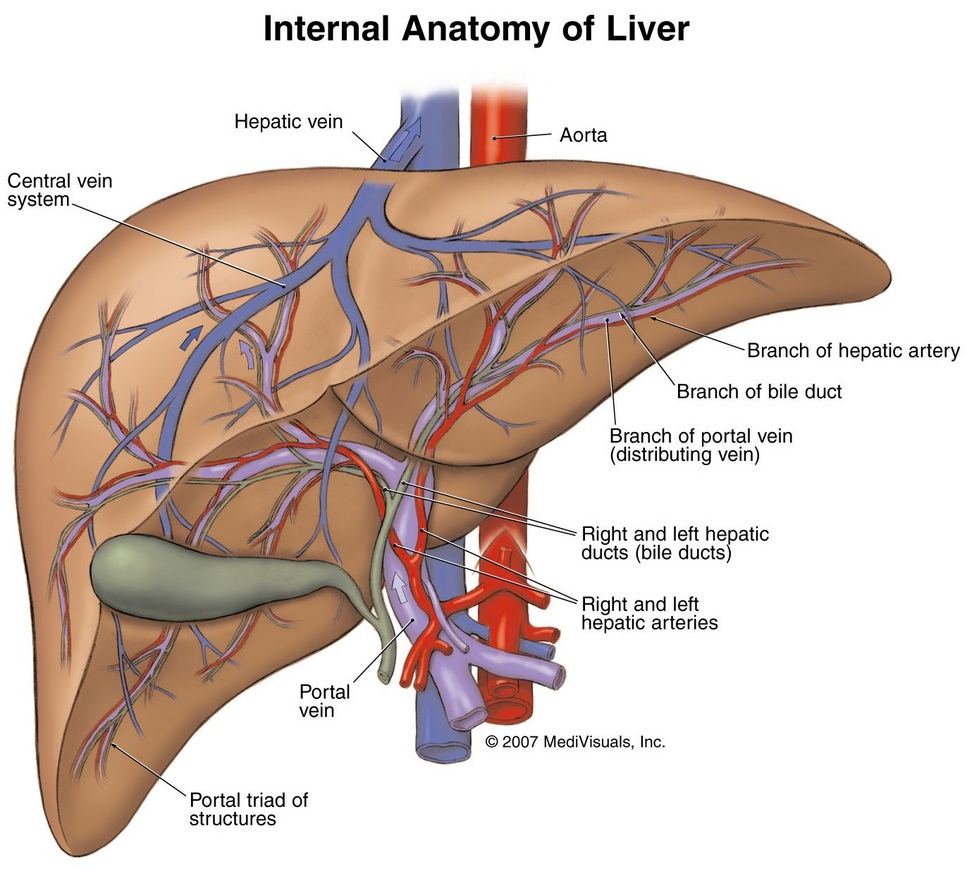The Excretory System | Period 3 Biology H
The Liver
The Liver is an important part of the digestive system as well as the excretory system. It helps to "clean" the blood by removing medications and toxins, such as alcohol, from the blood. Every minute, the liver filters more than a quart of blood. Next, the liver actually breaks down some of these potentially harmful proteins and chemicals into a harmless chemical waste called urea. This process is called deamination. This harmless chemical is then released back into the bloodstream where it is filtered out by the kidneys and expelled from the body in the urine.
The liver also has important functions relating to the circulatory system. It also filters out dead and defective blood cells, and breaks them down into glucose that is then used to regulate blood sugar levels. The liver also controls the release of bile from the gallbladder, which is located directly below the right lobe of the liver. This substance aids in the digestion of lipids in the stomach.
Possible Issues:
Seeing all of the important jobs that the liver does, it is no surprise that it is often susceptible to many diseases. Hepatitis is a viral infection of the liver that causes inflammation and swelling. It occurs in three different forms: hepatitis A, B, & C. Hepatitis A is the least serious, it usually can be cured within 3-6 months. There is no vaccine. Hepatitis B has a vaccine. It can cause permanent liver scarring, liver cancer, or liver failure. Hepatitis C can cause scarring or cancer. There is no vaccine.
The Liver is an important part of the digestive system as well as the excretory system. It helps to "clean" the blood by removing medications and toxins, such as alcohol, from the blood. Every minute, the liver filters more than a quart of blood. Next, the liver actually breaks down some of these potentially harmful proteins and chemicals into a harmless chemical waste called urea. This process is called deamination. This harmless chemical is then released back into the bloodstream where it is filtered out by the kidneys and expelled from the body in the urine.
The liver also has important functions relating to the circulatory system. It also filters out dead and defective blood cells, and breaks them down into glucose that is then used to regulate blood sugar levels. The liver also controls the release of bile from the gallbladder, which is located directly below the right lobe of the liver. This substance aids in the digestion of lipids in the stomach.
Possible Issues:
Seeing all of the important jobs that the liver does, it is no surprise that it is often susceptible to many diseases. Hepatitis is a viral infection of the liver that causes inflammation and swelling. It occurs in three different forms: hepatitis A, B, & C. Hepatitis A is the least serious, it usually can be cured within 3-6 months. There is no vaccine. Hepatitis B has a vaccine. It can cause permanent liver scarring, liver cancer, or liver failure. Hepatitis C can cause scarring or cancer. There is no vaccine.
The Excretory System

Vocabulary
Deamination: The breakdown of proteins into urea in the liver.
Urea: Chemial waste that results from the breakdown of amino acids; found in urine.
Deamination: The breakdown of proteins into urea in the liver.
Urea: Chemial waste that results from the breakdown of amino acids; found in urine.
Click here for a helpful animation on deamination.